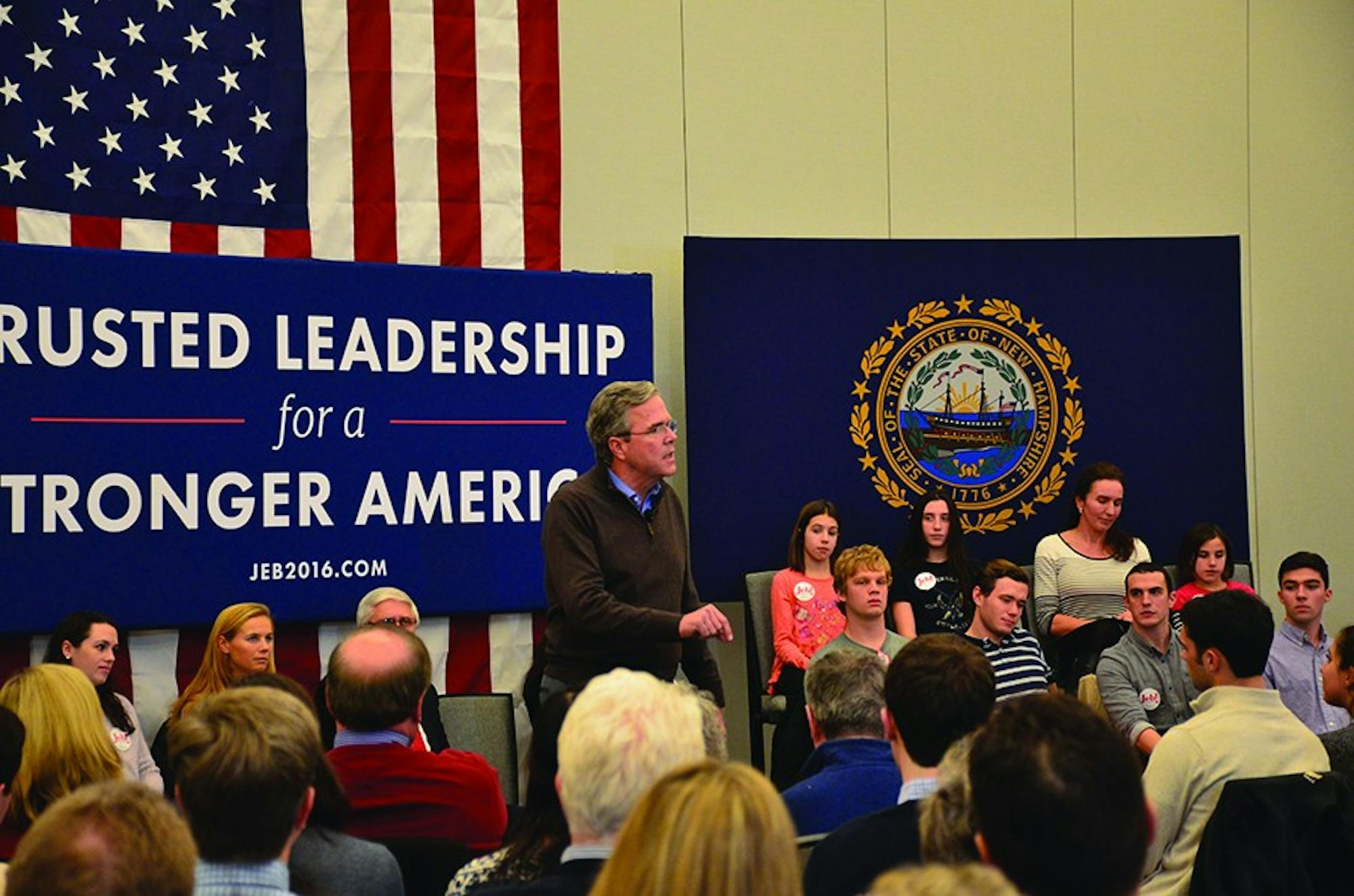A crowd of about 150 people flocked to the Hanover Inn to see Republican presidential candidate Jeb Bush speak about his experience as a leader and his goals of cutting back the government, reducing the national debt and his position within the Republican Party.
The majority of people in the crowd were Upper Valley residents.
Bush said that Republicans must pick someone who can both beat the Democratic candidate and lead the country. He said that his experiences as governor of Florida and his ability to make “tough decisions” and “solve problems” makes him the best candidate. He cited his time as the governor of Florida, where he cut taxes by $19 billion, created 1.3 million jobs, took on public unions and reduced government workforce by 11 percent as proof of his capability to lead the United States.
In addition, he questioned Republican presidential candidates Ted Cruz, Marco Rubio and Donald Trump’s leadership experience. He argued that Cruz and Rubio only sponsored two bills that passed into law as senators and criticized Trump, saying “it’s all about him.”
He also said that he had a firm conservative standing, adding that Cruz and Rubio expanded Medicaid while he did not.
“Leadership is about having a servant’s heart and a backbone to stand on what’s right,” Bush said. “That’s what we need in America today — we don’t need another talker!”
Bush said that he would reduce the size of the government and criticized its inefficiencies. He said he would reform the overly complicated and overreaching policies that hurt small businesses as well as reform financial regulations.
He said that he will regulate government spending better through “simplicity and transparency.” Bush added that his financial regulatory architecture would have fewer entities, focus on capital adequacy, raise capital requirements and restrict the consumer protection bureau, which he said “stifles the ability for credit to be allocated to the next generation.”
Bush also emphasized that his approach to economic policies would be to stop restricting businesses and the economy.
“If you could expand economy by businesses investing in the community, the multiplier effect is far better than taxing them, regulating them and shrinking the economy,” he said. “It creates more prosperity for more people.”
When one of the attendees expressed his concerns about government debt, Bush said he would curb national debt in a variety of ways. Bush said he would grow the economy at a faster rate so that he could lessen the demand on the government, brought on by programs such as social security or food stamps, reform entitlements such as Obamacare, and raise the floor for low-income beneficiaries. He added that he would suppress income benefits for high-income individuals and work against lifetime employment for government workers. Bush also said that he would decrease the national debt by giving power back to the states, which he said would save several hundred dollars because states would not be constrained by the federal government.
When asked about the influence of “big money” on politics, Bush said the answer to corrupt money is “transparency and accountability.” With transparency of campaign donations, including the amount of money donated and the name of donors, the need for limiting maximum campaign donations will disappear and campaigns will be able to overcome the control of super PACs, he said.
Another attendee voiced her concerns about healthcare. Bush criticized Obamacare and said he would replace it with an insurance plan that would deal with highly costly treatment.
He also addressed the difficulties of young students and said he would alleviate their burden by eliminating the student loan program and challenging colleges to lower costs.
Bush also emphasized the fact that he is the only Republican presidential candidate who believes in climate change. He noted that people are partially responsible for climate change. While he said “we have a responsibility to be guardians of the planet,” he emphasized the need to find the proper balance between conserving the environment while not limiting economic opportunities.
After an audience member raised concern about the Republican party drifting too far right, Bush said that he is a moderate Republican, adding that he would find a common ground between both sides of controversial social issues.
Attendee Jimmy McColgan ’19 said he was excited to hear the opinions of a candidate who was “conservative but not too far to the right.”
On the issue of domestic terrorism, Bush said that he would tighten visa and immigration programs and prevent radicalization by subjecting people who travel frequently to Middle East to additional screenings before they are allowed to re-enter the country. He added that passing security bills such as the Patriot Act would allow the government to act on domestic terrorism before it happens.
When asked for his thoughts on the Trans-Pacific Partnership — a trade agreement between 12 Pacific Rim countries reached last October — Bush said he had not read it yet. He added that he is supportive of treaties that open trade with other countries as long as there are methods to protect the U.S. from unfair trades. He also wanted to signal to Asian countries that the United States is not stepping down, and that such a partnership is necessary to alleviate Asia from Chinese control.
He ended the event by affirming his pro-life stance, saying he believes, “life is a gift from God.”
Charles Springer ’17, president of College Republicans, said that he was excited to have “any candidate of the Republican Party here [at the College].”
After the event, Vermont-native Angela Kohanski, an undecided Republican, said she applauded Bush for being the only one with a plan and strongly favored his economic policies as it would create more jobs.
The event was affiliated with neither the College nor the College Republicans.




